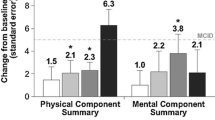Summary
Two randomised, double-blind, cross-over studies inhealthy volunteers given captopril 50 mg b. d. (n = 37; Study I) or enalapril 20 mg o. d. (n = 40; Study 2) and placebo for 2 weeks have been done to examine general well-being. Subjective experiences were evaluated using the standardised, Minor Symptoms Evaluation-profile (MSEP), which was completed during Run-in and on Days l, 4,7 and 14 in the morning.
In comparison to placebo and the Run-in period, neither captopril nor enalapril affected the MSEP dimensions of Vitality, Contentment and Sleep. Captopril treatment was also assessed by applying the Quality of Life Clinical Questionnaire during Run-in and on Days 7 and 14. No improvement in the quality of life was demonstrated during treatment in comparison with the placebo or the Run-in period. Thus, no mood elevating effect of the ACE-inibitors captopril and enalapril was demonstrated in healthy volunteers.
Cough, which is believed to be a common adverse effect of ACE-inhibitors, was no more frequent during the treatment with captopril or enalapril than with placebo.
It is concluded, that short-term treatment with captopril or enalapril is not perceived differently by healthy volunteers than placebo or no treatment at all. Furthermore, the cough associated with ACE-inhibition may be dependent on the duration of treatment, and two weeks was apparently too short for it to emerge.
Similar content being viewed by others
References
Williams GH (1988) Converting-enzyme inhibitors in the treatment of hypertension. New Engl J Med 319: 1517–1525
Guidelines for management of mild hypertension (1989) Memorandum from WHO/ISH meeting. J Hypertension 7: 689–693
Vidt DG, Bravo EL, Fouad FM (1982) Captopril. N Engl J Med 306: 214–219
Todd PA, Heel RC (1986) Enalapril: a review of its pharmacodynamic and pharmacokinetic properties, and therapeutic use in hypertension and congestive heart failure. Drugs 31: 198–248
Zubenko GS, Nixon RA (1984) Mood-elevating effect of captopril in depressed patients. Am J Psychiat 141: 110–111
Croog SH, Levine S, Testa MA, Brown B, Bulpitt CJ, Jenkins CD, Klerman GL, Williams GH (1986) The effects of antihypertensive therapy on the quality of life. N Engl J Med 314: 1657–1664
Dahlöf C, Dimenäs E, Olofsson B (1989) Documentation of an instrument for assessment of subjective CNS-related symptoms during cardiovascular pharmacotherapy. Cardiovasc Drugs Ther 3: 919–927
Dahlöf C (1990) Minor Symptoms Evaluation (MSE) Profile — a questionnaire for assessment of subjective CNS-related Symptoms. Scand J Prim Health Care [Suppl l]: 19–25
Dimenäs E, Wiklund I, Dahlöf C, Lindvall KG, Olofsson B, Faire U de (1989) Differences in the subjective well-being and symptoms of normotensives, borderline hypertensives and hypertensives. J Hypertension 7: 885–890
Testa MA, Sudilowski A, Ripey RM, Williams GH (1989) The Quality of life Clinical Questionnaire-documentation of a short form for clinical assessment of quality of life among hypertensive patients. Am J Prev Med 5: 82–89
Dupuy HJ (1984) The Psychological General Well-Being (PGWB) Index. In: Wenger NK, Mattson ME, Furberg CD, Elinson J (eds) Assessment of quality of life in clinical trials of cardiovascular therapies. Le Jacq Publishing Inc., p 170–183
Bradley JW (1968) Distribution-free statistical tests. Prentice-Hall, London, pp 68–86
Dimenäs E, Dahlöf C, Jern S, Wiklund I (1990) Defining quality of life in medicine. Scand J Prim Health Care [Suppl 1]: 9–12
Dahlöf C (1991) Well-being (quality of life) in connection with hypertensive treatment. Clin Cardiol Drugs Ther 14: 97–103
Das S, Chatteqee TK, Ghosh JJ (1982) Adrenal involvement in captopril-induced potentiation in morphine analgesia. Eur J Pharmacol 85: 217–220
Olajide D, Lader M (1985) Psychotropic effects of enalapril maleate in normal volunteers. Psychopharmacology 86: 374–376
Steiner SS, Fridhoff AJ, Wilson BL, Wecker JR, Santo JP (1990) Antihypertensive therapy and quality of life: a comparison of atenolol, captopril, enalapril and propranolol. J Human Hypertens 4: 217–225
Fletcher AE, Bulpitt CJ, Hawkins CM, Havinga TK, Ten Berge BS, May JE, Schuurman FH, Van der Veur E, Wesseling H (1990) Quality of life on antihypertensive therapy: a randomized double-blind controlled trial of captopril and atenolol. J Hypertension 8: 463–466
Yeo WW, Ramsay LE (1990) Persistent dry cough with enalapril: incidence depends on method used. J Human Hypertension 4: 517–520
Author information
Authors and Affiliations
Rights and permissions
About this article
Cite this article
Dahlöf, C., Dimenäs, E. General well-being during treatment with different ACE-inhibitors: Two double-blind placebo-controlled cross-over studies in healthy volunteers. Eur J Clin Pharmacol 43, 375–379 (1992). https://doi.org/10.1007/BF02220612
Received:
Accepted:
Issue Date:
DOI: https://doi.org/10.1007/BF02220612




